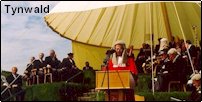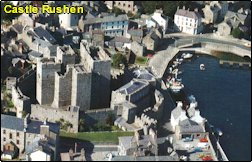
History and Heritage

History and Heritage
 The Island has a rich and fascinating history leading to its present
unique character and political situation. It is indeed a very different island with its
own laws, its own currency and stamps, its own native tongue, and the world’s oldest
continuous parliament, Tynwald. It is not and never has been part of the United Kingdom.
It is not a member of the European Union but it does enjoy a special relationship whereby
goods can be traded freely within the Union whilst having no direct involvement with its
finance.
The Island has a rich and fascinating history leading to its present
unique character and political situation. It is indeed a very different island with its
own laws, its own currency and stamps, its own native tongue, and the world’s oldest
continuous parliament, Tynwald. It is not and never has been part of the United Kingdom.
It is not a member of the European Union but it does enjoy a special relationship whereby
goods can be traded freely within the Union whilst having no direct involvement with its
finance.
There is evidence of the settlement of the Isle of Man as early as 7,000 years ago with examples of Megalithic burial places, Iron Age hill forts and early Christian chapels, or keeils, dotted all around the Island. Following the Viking raids of the late eighth century suzerainty was claimed by Norway and the Island, with its key strategic position in the middle of the Irish Sea, became an important base. The Vikings gave the Island its own legislative assembly and named it "Tingvollr", meaning assembly field, later to be called "Tynwald".
Following the fall of the Vikings in the mid-13th century, the Island became a pawn in a game of war between Scotland and England with control passing time and again from one to the other. In 1405 Henry IV of England finally defeated the Scots and took the Sovereignty of Mann. He granted the Lordship of Mann to Sir John Stanley so starting a succession through the Stanley's (Earls of Derby) and the Dukes of Athol.
During the late 17th and early 18th centuries the Island became a centre of extensive smuggling into the United Kingdom. To stamp this out the Island was brought under the almost complete control of the Imperial Government. In 1866 Westminster restored some of its self-governing powers back to Tynwald.
The Island’s current status is that of a Crown Dependency with a Governor appointed every five years to represent the ‘Lord of Man’, the Queen. However control of Manx affairs and law making lies now principally with Tynwald which comprises a 24 member elected House of Keys and an Upper House, the Legislative Assembly, presided over by a Manx-born President of the Council. In 1979 the Island celebrated its millennium or one thousand years of devolution and semi-independent self-government.
 The Island’s unique history and
heritage is splendidly preserved and explained in ‘The Story of Mann’’,
award-winning displays in many places round the Island created by the Manx Museum and
National Trust and Manx National Heritage. The Manx Museum itself, the House of Manannan,
Castle Rushen, Peel Castle and Cregneash Village are all particularly well worth visits.
The Island’s unique history and
heritage is splendidly preserved and explained in ‘The Story of Mann’’,
award-winning displays in many places round the Island created by the Manx Museum and
National Trust and Manx National Heritage. The Manx Museum itself, the House of Manannan,
Castle Rushen, Peel Castle and Cregneash Village are all particularly well worth visits.
| A Manx Toast "Shoh slaynt as shee as eash dy vea, as maynrys son dy bragh." "Here's health and peace and length of life, and happiness for ever." |